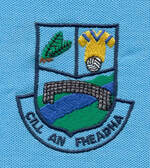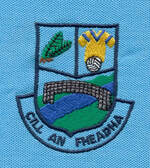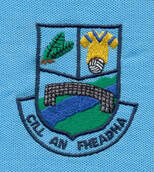OUR SCHOOL SELF-EVALUATION REPORT
AND SCHOOL IMPROVEMENT PLAN
In the last year, we have looked at teaching and learning in our school to find out what we are doing well. This is what we discovered:
The students enjoy reading and demonstrate very good reading fluency skills in addition to enjoying talking about what they are reading. Reading is very well promoted within our school and there is very good home-school communication in relation to reading.
- The students enjoy maths lessons and are offered lots of opportunities to engage with in the maths curriculum in fun, engaging and interactive ways. Regular maths assessment assists the school in promoting early intervention for students experiencing mathematical difficulties.
- Our students display very good self-esteem and our staff and parents put a big emphasis on our students’ welfare.
- We provide very good support for our students with Special Educational Needs and students who need additional support to successfully access the curriculum.
- We focus on the holistic development of our students, by fully delivering the curriculum and celebrating success school and class-wide.
- We encourage a ‘student voice’ school-wide and we give our students lots of responsibilities throughout their years in our school (School committees, councils, leadership roles etc…)
- We enjoy engaging in STEM (Science, Technology, Engineering and Mathematics) development and our students enjoy learning in these areas.
This is what we did to find out what we were doing well, and what we could do better:
- Our children are happy coming into school and we feel that this has a very positive impact on our students’ willingness to engage with the curriculum.
- We regularly assess our students, through both formal and informal methods and this helps to inform our approach to teaching.
- Feedback from our parents is very positive. We pride ourselves on the relationship that we have with our families.
- We have many student committees within the school and this provides that students with an opportunity to share their thoughts and experiences with the teaching staff.
- In terms of our School self-evaluation in Gaeilge, we surveyed our students from 3rd to 6th class and also surveyed our families. Questionnaires focussed on attitudes towards spoken-Irish. The teachers also completed a survey which also served as an evaluation of our approach to the teaching of Irish. Surveys and student focus groups sought to evaluate how our pupils “enjoy their learning (in Gaeilge), are motivated to learn, and expect to achieve as learners” and also examined how our students “demonstrate the knowledge, skills and understanding required by the Primary Curriculum”. In collating evidence from staff surveys and from a subsequent discussion at a staff meeting, it was also agreed by the staff that we could put a greater emphasis on Gaeilge Neamhfhóirmiúil (informal Gaeilge) school wide.
This is what we are now going to work on:
After numerous discussions and ongoing evaluation of the given data, it was agreed that our school would specifically focus on the following areas in order to improve our practice in the subject area of Gaeilge.
- We want to increase the students’ enjoyment and motivation to use Teanga Ó Bhéal i nGaeilge (Oral Irish) whilst providing ample opportunities for students to use Gaeilge across the curriculum and school-wide.
- Use Gaeilge in PE lessons, during incidental conversations and in a wide range of school activities (quizzes, songs/poems, dramas, dance etc…)
- The school staff are going to engage in professional development in how we could best improve the standard of Gaeilge across the school.
- The staff will develop assessment approaches for Teanga Ó Bhéal i nGaeilge (oral Irish) using a range of collaborative approaches.
- Support parents to help their students with Gaeilge.
This is what you can do to help:
We would encourage parents to take every opportunity to use whatever bit of Gaeilge that you may have with your children. Encourage your children to use the phrases they have learned in school at home. The more they can hear Gaeilge used in everyday conversation the more it will grow on their them.
We will send home different phrases that we are using in school. These will feature in our monthly school newsletter. We encourage parents to use these regularly at home with your children.
We also encourage parents to use some of the following websites to pick up some incidental Gaeilge. This will also help you to support your child with his/her learning.
We will send home different phrases that we are using in school. These will feature in our monthly school newsletter. We encourage parents to use these regularly at home with your children.
We also encourage parents to use some of the following websites to pick up some incidental Gaeilge. This will also help you to support your child with his/her learning.
- www.isfeidirliom.ie This is a free online course designed by a primary school teacher for parents or anyone who would like to help children learn Irish. The course is self-paced and you can come in and out of the 10 lessons in your own time.
- www.focloir.ie This a new English-Irish Dictionary and is available free of charge. It is a contemporary dictionary which covers both general language use and terminology.
- www.easyirish.com This is a collection of podcasts which you can download and listen on your computer, tablet or smartphone. All lessons are self-paced and designed to fit around your schedule.
- www.léighleat.com This site has some e-books which you can listen to and/or read with your child. They range from picture books to stories to poems.
- Cúla4 ar TG4 This site provides programmes and games that will support language skills in Irish. Your child will benefit greatly from listening to spoken Irish regularly at home & they will enjoy the programmes on Cúla 4.
- https://www.duolingo.com This is a great website that helps people to improve their Gaeilge with as little as 5-minutes practice every day.
- https://askeabns.wordpress.com/focloirin-cainte/ An excellent website with slideshows covering different Irish vocabulary groups.




